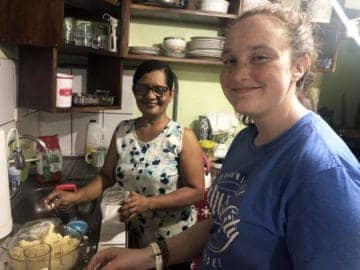
24/7 or Standard Homestay
Which Homestay Program is right for me – 24/7 or Standard Homestay?
Many future students ask us this question: They are planning a Spanish immersion course in Costa Rica and want to get as much out of it as possible. So, naturally, they opt for the 24/7 homestay, where they will have all-day contact with their family, three meals a day, day trips with family members, and so on. However, the price is significantly higher, so is it really worth it?
In my opinion, the answer is not necessarily!
Our standard homestays in Heredia are with families who have been with us for many years, and they love their role with students. They genuinely enjoy the cultural exchange. In addition, this program lets them be productive from home, which they are especially grateful for, particularly the mothers with younger children or those without formal job training. These families spend endless hours chatting, not because they are paid more to do so, but because they want to. They invite the students on weekend daytrips, and they always include them in family events. When students leave, they stay in touch with their family for years to come. Many homestay mothers end up visiting their “hijos” in their home countries, and students return time and again to the same family on future visits to Intercultura or just to vacation in Costa Rica.
My recommendation, based on 27 years’ experience, is this:
Sign up first for the regular homestay program, and let us know that full immersion is a priority. If the family we choose doesn’t fulfill your expectations, you can request to change to a 24/7 family during your first few days, and pay the difference.
The alternative is to pay the higher fee, arrive to your family, and realize that most of the other students who are with “regular” families are having pretty much the same experience you are, but for a much lower price. They may not have a private bathroom or guaranteed tours, but they are learning just as much as you are from their families, and probably spending about the same amount of time with them.
Remember, the success of a cross-cultural experience will always depend more on what you put into it than how much you pay for it. So, the more effort you put into talking with and doing things with your host family, the more you will learn about Costa Rican culture, and of course, Spanish!
written by Laura Ellington, co-founder of Intercultura Costa Rica



